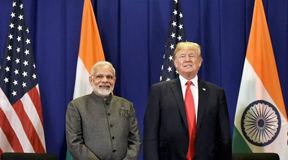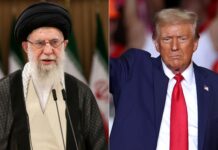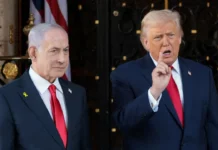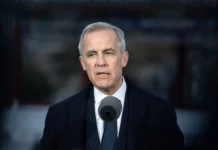 WASHINGTON: Prime Minister Narendra Modi’s meeting with President Donald Trump in the Philippines shows the “strategic convergences” in geopolitics and economy between India and the US, India’s envoy Navtej Sarna has said.
WASHINGTON: Prime Minister Narendra Modi’s meeting with President Donald Trump in the Philippines shows the “strategic convergences” in geopolitics and economy between India and the US, India’s envoy Navtej Sarna has said.
Modi and Trump held their second bilateral meeting in Manila on Monday, on the margins of the East Asia Summit in the Philippines.
Modi held wide-ranging talks with Trump and told him that both nations can rise beyond bilateral ties and work jointly for the future of Asia, reflecting their growing convergence on strategic issues in the Indo-Pacific region.
“President Trump and the prime minister have again underlined the closeness that they have between them and the strategic convergences both in geopolitical terms as well as in economic terms that India and the US have been working on,” Ambassador to the US Sarna said in his address to US lawmakers and representatives of the Indian corporate leadership at the Capitol Hill.
He was speaking on the occasion of the release of a report ‘Indian Roots, American Soil’ by the Confederation of Indian Industry, according to which 100 Indian companies in the US account for USD 17.9 billion in investment and for generating 113,000 jobs in the US.
The India-US closeness and strategic convergences has been evident in the visit of Prime Minister Modi to the US and subsequent visits of Defense Secretary Jim Mattis and Secretary of State Rex Tillerson to India and now again in the meeting between the president and Prime Minister Modi, Sarna said.
Tulsi Gabbard, the first Hindu lawmaker in the US Congress, said it is an exciting time for the US and India. “We have seen a continued growth and momentum building around strengthening of relationship between our two countries,” she said.
“The centerpiece and kind of a strong foundation of that relationship has always been centered around growth of trade and commerce between the two countries”, she said.
In 2016, the trade of all US goods and services with India totaled USD 114 billion dollars. Indian companies, she said, have not only added value to US economy but are investing in American communities as well.
India was America’s ninth largest trading partner last year, accounting for nearly USD 70 billion in trade which has laid a strong foundation for the two countries to uphold their commitment to.
“There is much work to be done,” she noted.
Congressman Ami Bera said US-India ties is not a relationship that stops when a new administration comes into the office. “It is one that as (former) President (Barack) Obama said can be the defining partnership of the 21st century. I truly believe that,” he said.
“An example of that is you know we just walked off the House floor voting for our Defense Authorization Act. In there is a paragraph talking about India becoming a Major Defense Partner. There are unique opportunities for American and Indian companies to work together…India has the desire to buy some of our military hardware, how do we make that easier…looking at the export control regime on our end,” he said.
Referring to his recent visit to Japan, Bera said the Japanese are “very bullish” on India. “The Japanese are very bullish on India and the partnership and possibility of trilateral and even quadrilateral relationships,” he said.
According to influential Congressman Ted Yoho, Modi said just recently following his meeting with Trump that relations between the US and India are not just for our mutual interests but they go much beyond that.
“I think that speaks loudly of those beliefs,” he said. “We have the longest serving democracy in the world. (India) has the largest one. And together we can do some great things,” Yoho said.
More than a dozen influential lawmakers spoke on the occasion.-PTI






